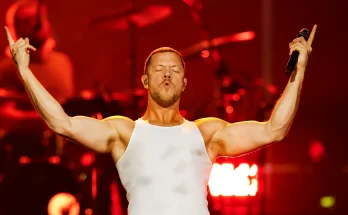In late May 2025, during their European tour stop in Milan, the American rock band Imagine Dragons caused a wave of discussion when frontman Dan Reynolds picked up a Palestinian flag that was thrown onto the stage, held it aloft to the crowd, draped it around his shoulders and, in some versions of the footage, kissed it before returning it to the audience. The moment was captured on social media and quickly went viral, drawing reactions ranging from praise to fierce criticism.
For many, the gesture appeared as a public statement of solidarity with Palestinians, coming at a time when attention globally was intensely focused on the humanitarian crisis in Gaza and the broader Israeli-Palestinian conflictYet the incident gained its full weight because of the band’s recent history: in August 2023, Imagine Dragons had performed in Tel Aviv—despite an active cultural boycott movement and appeals to artists to cancel shows in Israel. That performance, and Reynolds’ subsequent explanation, created a backdrop of controversy which now coloured this Milan moment.
Reynolds has spoken previously about the Tel Aviv date. In a 2024 interview, he stated, “I don’t believe in depriving our fans who want to see us play because of the acts of their leaders and their governments. I think that’s a really slippery slope. Once you start doing that, there’s corrupt leaders and warmongers all over the world, and where do you draw the line?” His stance then was one of maintaining a separation between political decisions of states and the rights of individual fans to attend concerts. That stance itself drew criticism from groups and individuals who argued that performing in Israel during that time was tantamount to tacit support of the Israeli state’s policies.
What makes the Milan event significant, beyond the gesture itself, is the context and the tension between the band’s earlier decision and what appeared to be a public shift or at least a willingness to display a symbol of Palestinian solidarity. Many on social media applauded the moment. One pro-Palestinian user wrote: “Very nice to see more people showing support.”Others were much less charitable: some accused the band of hypocrisy, arguing that the earlier show in Israel undermined the sincerity of the Milan flag display. For example:
This dichotomy of reactions is at the heart of the controversy: is the gesture meaningful and brave, or is it performative and contradictory?
From a broader perspective, celebrities and international musicians increasingly find themselves navigating complex terrain: fans and social movements expect more from public figures, particularly around human rights issues, and symbols like flags carry heavy weight. According to one music-culture blog, the Milan flag moment “marks a notable shift” for the band.At the same time, such gestures invite scrutiny: what else will follow? Is this a one-off statement or the start of a sustained stance?
Looking at the timeline: in August 2023, Imagine Dragons performed in Tel Aviv amid calls to cancel; critics argued the band should stand with Palestinians and refuse to perform in what they labelled an apartheid state.In Milan in May 2025, Reynolds waves the Palestinian flag. At first glance the two actions seem contradictory: one day playing in Israel despite boycott calls, the next publicly displaying Palestinian solidarity. Supporters argue that this evolution is meaningful—people and artists learn, change their stance, and their actions now reflect a deeper awareness. Skeptics argue it’s too little too late, or that the timing and symbolism are opportunistic.
It’s also important to note how the audience and platform matter: the Milan gesture happened at the end of a concert, in front of thousands, with cameras and social media sharing the moment immediately. The previous Tel Aviv show likewise had huge attendance (some reports cite 60,000 fans) In both cases, what the band does on stage resonates far beyond the venue: it becomes part of broader cultural and political conversations.
Reynolds and Imagine Dragons have elsewhere shown engagement with other social causes—most notably LGBTQ+ rights—and that partly explains why their Milan flag act jumped into discussions about intersectionality of issues, global activism, and whether mainstream artists can or should take explicit stands.The band’s willingness to engage with multiple causes gives the Milan moment a layered texture: it’s not just about one issue, but about how artists manage their public platforms.
From a fan-perspective, reactions are complex. In Reddit threads, for example:
These reflect a dual view: some fans are willing to give the band credit for taking a stand now, others see it as too little, too late—or worse, as inconsistent.
What this means moving forward is uncertain. Will Imagine Dragons follow this up with further action? Will they revise their touring decisions, make public statements, align their platform more clearly with Palestinian rights? Or will the Milan moment remain a symbolic gesture without structural change? For many critics, symbolism without substantive backing is vulnerable to charge of hypocrisy.
In sum, the Milan concert flag-waving by Dan Reynolds stands as a significant, provocative moment. It invites questions about what it means for artists to engage politically, how past actions shape current credibility, and how fans interpret shifting stances. The moment underscores the heightened expectations on public figures to act coherently across time and geography when they wish to express solidarity. Whether this becomes a turning point for Imagine Dragons, or a singular headline, remains to be seen.



